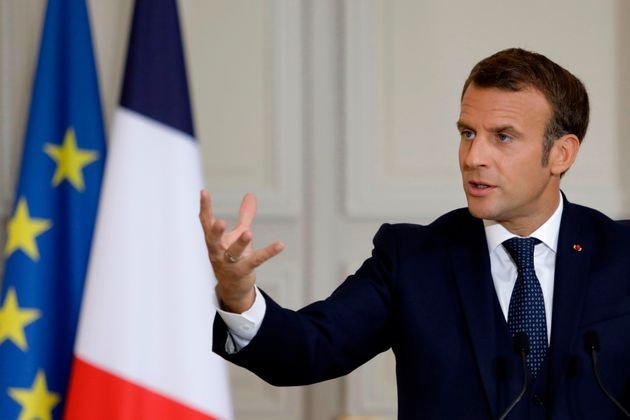
France President Emmanuel Macron has expressed his disappointment over Lebanon’s response towards his effort to set up a new government that will promote national unity following Mustapha Adib back-off from the mission as he on Sunday, September 27, convened a press conference at the Elysee Palace to express his “shame” over the matter.
In his speech, he notably denounced the “collective betrayal” of the Lebanese political parties, which were unable to put their differences aside to form a government of national unity and try to get the country out of the economic, social and political crisis. and sanitary in which it is immersed.
YOU MAY ALSO LIKE: Lebanon’s PM-Designate Resigns After Deadlock Over New Govt. Creation
It must be said that the President of the French Republic is personally committed to resolving these difficulties. Since the explosion that devastated Beirut on August 4, the French leader has visited the Cedar Land twice and on September 1, he promised local politicians to form a “competent government as soon as possible.
Was it necessary to use strong words to describe his disappointment?
“I think he was right: France and Emmanuel Macron have repeatedly given opportunities to the Lebanese government, but nothing has changed”, Alex Issa, a doctor in political science and specialist in Lebanon said.
Stéphanie Baz, a consultant in political communication and a fine connoisseur of the country, also said it wasn’t wrong as the man must have felt betrayed by the failure of negotiations between the different parties. “He was one of the only leaders to come around, to try to make things happen… I understand that personally, he is very angry.”
“Because this renunciation of the Lebanese political class is far from being the first. If only since October 2019,” recalls Alex Issa.
“It repressed the demonstrations of a population exhausted by the economic situation, then showed itself unable to protect the people against the epidemic of coronavirus and the explosion of the port of Beirut.
“These are leaders who need an electric shock. They are so corrupt to their fingertips that they haven’t changed a thing for years. If Emmanuel Macron does not say it, who is going to say it? ”Asked Stéphanie Baz.
“It seems to me that the Lebanese political class wants to receive help, but without making the slightest effort. The system of patronage and oligarchy suits those in power,” Alex Issa continued on justifying the terms of Emmanuel Macron’s speech.
“And even when they promised him to try to make concessions, we saw what happened, even for the good of the Lebanese people, they are not ready to give up anything, not to lose any power,” he added.
Both experts said the change will take some time to fall in place.
“I think he used those words after years of corruption, of confessionalism, there is no more unspoken words left. Everyone now knows what the situation is.” Stéphanie Bazsaid, while Alex Issa added, “It took an outside intervention to push the political class to try to understand, and above all, we must support the Lebanese people. Before the explosion, no one France, nor any other country had condemned the repression of the demonstrating population.”
France is the appropriate actor in a complicated context
Both specialists agree that France has a special role which allows it to position itself in this way.
“Is it up to Emmanuel Macron to redefine the Lebanese political spectrum? Surely not. But as head of state of the fifth world power and in view of the historical relations between the two countries, he can express himself, make a wish, a wish that the situation improve for Lebanon,” Stéphanie Baz said.
It’s quite understandable that France’s place in Lebanese issues is unique. “Historically, we have seen that it was always France that was there for Lebanon, and no other country”, Alex Issa hinted, while adding that “He is the right person, as a mediator, as a facilitator to try to find a solution.”
For the political science and international relations researcher, none of the powers at work in the Middle East could have had the same legitimacy.
“It couldn’t be Iran since it would have been seen as the pro-Hezbollah camp. It couldn’t be Saudi Arabia because it would have been seen as the pro-Hariri camp, nor the United States because they are seen as Israel’s allies. Only France represents the balance between all these powers.” added the expert.
Condemn Hezbollah? Yes, but not only…
“Hezbollah must not believe itself stronger than it is”, hammered Emmanuel Macron on Sunday. For the President of the Republic, this party “cannot at the same time be an army at war against Israel, a militia unleashed against civilians in Syria and a respectable party in Lebanon.”
In his speech, Mr Macron specifically targeted with his words the Shiite Islamist movement as well as the Amal movement, relatively similar and represented in parliament, reproaching them for their role in the fiasco of the last days.
But on the other hand, Alex Issa thinks that the President of the Republic made a mistake. “He was wrong in blaming them for the failure of the negotiations. Hezbollah contributed to this failure, but it is not the only one, ”regrets the researcher, who found Emmanuel Macron’s position“ excessive ”in this regard.
“Hezbollah was only created in 1982, and it only participated in the government in the 2000s,” recalls the academic. “We cannot blame him alone for decades of state and nation building failures. He contributed to it, that’s true, but it’s only part of the system. ”
Alex Issa further hinted that this exclusive condemnation of Hezbollah and Amal could “accentuate intra-Lebanese tensions”, by giving food to the detractors of these movements instead of “calling all the components of the country to unite.”
The doctor of political science, for example, would have liked President Michel Aoun, “who paralyzed the country for two years to be elected and who had already done so before so that his son-in-law would become a minister”, received his share of French criticism.
“It is not linked only to Hezbollah, but it must be singled out”, summarizes Stéphanie Baz. “He is not innocent.”
And now, what modalities for ending the crisis?
It was one of the most commented points of the intervention of Emmanuel Macron, to the point that it earned him public trials in “interventionism” or even in “neocolonialism”.
The French president declared to give four to six weeks to see if the mission government could still be appointed. “Or should we change the situation and go on a more systemic path of political recomposition in Lebanon?”, Launched the Head of State.
For Alex Issa, “The problem is that he was ambiguous, but he did not say how” he intended to advance towards a profound change in Lebanon. “When we talk about radical change, are we imposing a new system? Is there an UN-type foreign intervention to put in place a transition? Is it fair to the Lebanese political class to do it? Is it for the people? ”Asks the researcher.
Because this is the concern with the declaration of Emmanuel Macron: to what extent does France intend to allow its historic protégé to renew itself? According to Stéphanie Baz, the fear was born within a part of the Lebanese population that France, scalded by this new failure, is gradually withdrawing.
In the face of the “ingratitude” of the Lebanese leaders, let Paris give up in short. A concern for the moment unfounded, but what of the rest of the events?
YOU MAY ALSO LIKE: France Responds To UK’s Post-Brexit Channel Plan, “We Won’t Fall For It”
In addition, continues Alex Issa, if the situation continues to deteriorate, famines break out, the population suffers more from resistance to change from its leaders, rampant pauperization and the health crisis, the international community could decide to intervene directly.
“It is neither for France nor anyone else to impose a change unless there is a question of life and death. And there it would be up to an UN-type body to intervene,” the researcher specified.
As the academic sums it up, this is all the challenge that remains for Emmanuel Macron after having scolded so much this Sunday: “Who to spare while still causing the necessary changes, without harming the population?”












